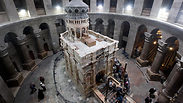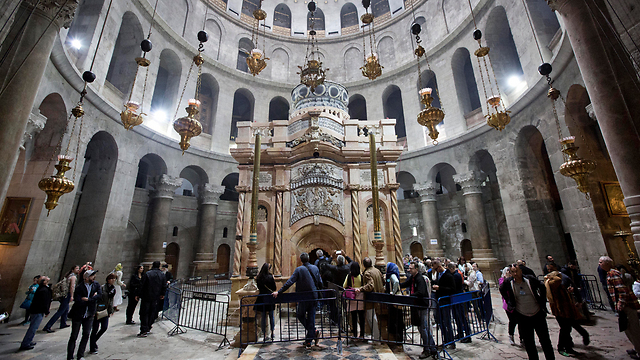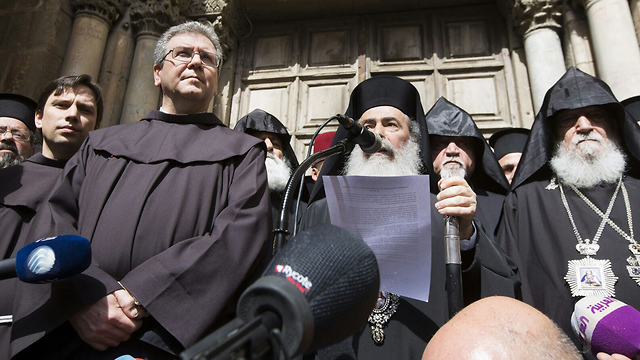

Jerusalem's Church of the Holy Sepulchre shut in land policy protest
Roman Catholic, Greek Orthodox and Armenian church leaders say holy site, where many Christians believe Jesus was crucified and buried, will be closed until further notice in protest against Israeli taxation affecting church property.
Roman Catholic, Greek Orthodox and Armenian church leaders said the holy site, a popular stop for pilgrims and where many Christians believe Jesus was crucified and buried, would remain closed until further notice.
A statement by the leaders accused Israel of a “systematic and unprecedented attack against Christians in the Holy Land” in pursuing a new tax policy and a proposed land appropriation law.
"These actions breach existing agreements and international obligations which guarantee the rights and the privileges of Churches, in what seems as an attempt to weaken the Christian presence in Jerusalem," the church leaders said in their statement, expressing their great concern.
"This reminds us all of laws of a similar nature which were enacted against the Jews during dark periods in Europe.
"This systematic campaign against the Churches and the Christian community in the Holy Land is a flagrant violation of the existing status quo. Recently this systematic and offensive campaign has reached an unprecedented level as the Jerusalem municipality issues scandalous collection notices and orders of seizure of Church assets, properties and bank accounts for alleged debts of punitive municipal taxes, a step that is contrary to the historic position of the Churches within the Holy City of Jerusalem and their relationship with the civil authorities.
"This systematic and unprecedented attack against Christians in the Holy Land severely violates the most basic, ab antique and sovereign rights, trampling on the delicate fabric of relations between the Christian community and the authorities for decades."

As part of a battle with Finance Ministry over budgets to the capital, the Jerusalem Municipality informed the Finance, Interior and Foreign ministries and the Prime Minister's Office that it had started collecting property tax debts of more than NIS 650 million from some 887 properties across the city, which belong to churches and United Nations institutions.
Municipality officials said these properties did not include houses of worship, which are exempt from paying property taxes by law, but rather properties used for non-prayer activities, including commercial activities.
Churches are exempt from paying property taxes as part of an agreement with the state, but the Jerusalem Municipality says it is not being compensated by the state for the money it is losing by not collecting these taxes.
After the protest move, an Israeli cabinet committee delayed by a week its scheduled consideration on Sunday of a bill that would allow the state to expropriate land in Jerusalem sold by churches to private real estate firms in recent years.
The stated aim of the bill is to protect homeowners against the possibility that private companies will not extend their leases of land on which their houses or apartments stand.
The churches are major property owners in the city. They say such a law would make it harder for them to find buyers for church-owned land - sales that help to cover operating costs of their religious institutions.
"This abhorrent bill ... if approved, would make the expropriation of the lands of churches possible," said the statement by Theophilos III, the Patriarch of Jerusalem, Francesco Patton, the Custos of the Holy Land, and Nourhan Manougian, the Armenian Patriarch of Jerusalem.
MK Rachel Azaria, who sponsored the legislation, said in a statement she agreed to delay the committee's discussion by a week so that "we could work with the churches" to try to resolve the dispute.
Jerusalem Mayor Nir Barkat said on Twitter it was illogical to expect that church-owned commercial property, including hotels and retail businesses, would continue to enjoy tax-exempt status.
"Let me make it clear: we are not talking about houses of worship, who will still be exempt from property tax, according to law," he wrote.
Outside the Church of the Holy Sepulchre, pilgrims voiced their disappointment at finding its doors shut.
"I am very upset. It's my first time here and I made a big effort to get here and now I find it closed," said Marine Domenech from Lille, France.
Yael Freidson contributed to this report.
















